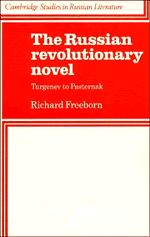1 - Egoistic nihilism and revolutionary nihilism
Published online by Cambridge University Press: 04 April 2011
Summary
In August 1860 Turgenev spent three weeks in Ventnor in the Isle of Wight. During that short period, and in characteristically wet and stormy English summer weather, he conceived the figure of his most significant literary hero, Bazarov, of his most famous novel, Fathers and Children, published two years later. The reasons for Turgenev's apparently sudden creation of such a positive hero, at such a moment in his life and in such an unlikely place, involve the much larger question of the ‘revolutionary’ situation that existed in Russia on the eve of the emancipation of the serfs in 1861.
The reforms upon which the Tsarist government had embarked after the defeat of Russia in the Crimean War were designed to modernise certain parts of the machinery of state while ensuring that the principle of autocratic rule remained unchanged. The linch-pin of the reforms was the emancipation of the serfs, but it was a linch-pin that, if allowed to slip, could easily precipitate the kind of peasant unrest that had assumed its most serious form in the revolt of Pugachyov, the Don Cossack, in 1773 and 1774. Worse still, perhaps, it could lead to civil war. Moreover, a change of such magnitude in a semi-feudal society would inevitably mean that the nobility, which depended so greatly upon serfdom for its economic as well as its social raison d'être, would be undermined as the leading class.
- Type
- Chapter
- Information
- The Russian Revolutionary NovelTurgenev to Pasternak, pp. 4 - 38Publisher: Cambridge University PressPrint publication year: 1983



